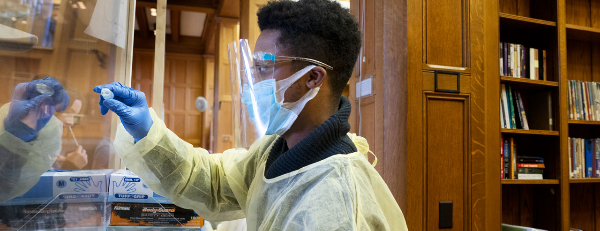- By Abigail Butler
- Around Town
 Print
Print  Photo by John Munson/Cornell University
Photo by John Munson/Cornell UniversityAt Cornell, committed leaders, expert faculty, trained staff and student hires have worked tirelessly behind the scenes to create a winning strategy to reactivate campus and keep the community safe from COVID-19. Cornell's science-based program to administer 30,000 tests a week in collaboration with Cayuga Health System and return individual results within 24 hours has allowed the university to proactively contact trace and limit disease spread. A campus COVID-19 tracking dashboard reveals a weekly rate of positive infections that hovers barely above 0.01%.
None of this came easy. Teams of Cornellians have labored around the clock to build an efficient system from scratch – including the Cornell COVID-19 Testing Laboratory (CCTL) where the massive volume of tests are processed.
In early June, Dr. Francois Elvinger, executive director of the College of Veterinary Medicine's Animal Health Diagnostic Center (AHDC), first approached the CCTL's director, Dr. Diego Diel, associate professor in the Department of Population Medicine and director of the virology lab in the AHDC, to ask if he might coordinate efforts to assemble a lab to test the campus community for coronavirus. The task was feasible, given that the AHDC routinely runs high-quality, high-volume tests to detect viruses and pathogens in chickens, cows, horses, deer, fish and many other animals when disease outbreaks occur. Together with the established scientific skills to conduct these tests, the Cornell team developed a strategic partnership with Cayuga Health System (CHS) that allowed the CCTL to be licensed for human testing.
By the beginning of July, Cornell leadership – President Martha E. Pollack; Provost Michael I. Kotlikoff; Gary Koretzky '78, vice provost for academic integration and professor of medicine at Weill Cornell Medicine; and Dr. Lorin Warnick, Ph.D. '94, the Austin O. Hooey Dean of Veterinary Medicine – had given the green light to develop a system to test students, staff and faculty in-house, for quick results that would speed up successful contact tracing and enable a rapid response from health care providers.
Understanding where the goalposts stood was an early challenge. Originally, university leaders planned to test all students, faculty and staff on campus once a week, about 3,000 tests a day. However, models developed by Peter Frazier, associate professor of operations research and information engineering, soon showed it was safer to test all undergraduates twice a week, which meant expanding the operation to collect up to 7,000 samples a day.
Diel, his staff and facilities crews built the CCTL. Collaborations with Weill Cornell Medicine, Cayuga Health System and Texas A&M University proved instrumental in providing initial COVID-19 samples to validate testing, with that validation happening under the licensure of Cayuga Health System and in coordination with CHS physicians. Researchers from across Cornell's Ithaca campus contacted Diel to volunteer their services, and CHS contributed Health Insurance Portability and Accountability Act-compliant data and scheduling systems, sample collection procedures, and mechanisms for reporting results to state and local public health departments.
"The team was so wonderful," said Kim Potter, director of business operations at the AHDC, who was pulled in to the CCTL to oversee the sample collection infrastructure, supply chain management and information technology. "They just said, 'OK, we'll figure it out.' And they did. There were people all across campus that helped, people from the sign shops, guys making plexiglass framework for us on a moment's notice, people deploying that stuff in the middle of the night so that we could be ready the next morning."
"This was not just one person or any one team," Potter said. "This was the Cornell village making this work. I don't think people realize the effort it took to put this together."
v16i43



